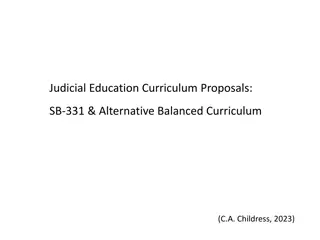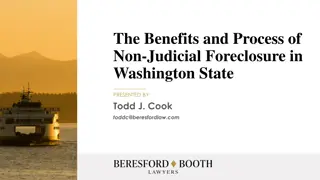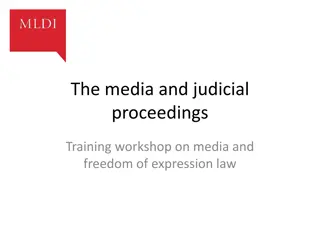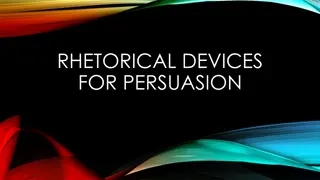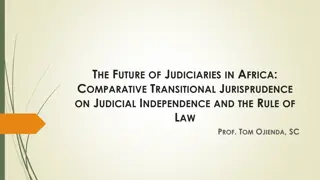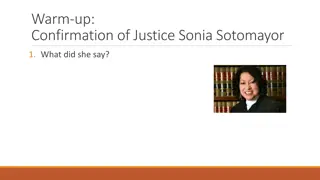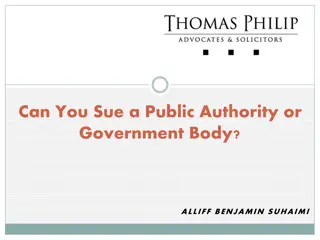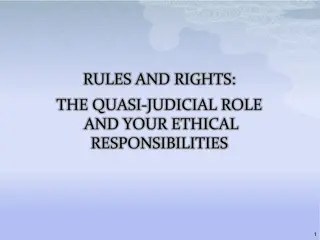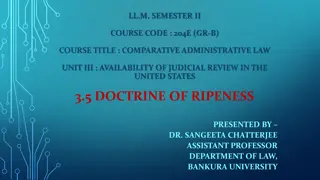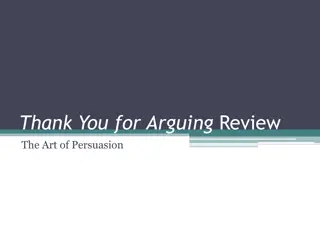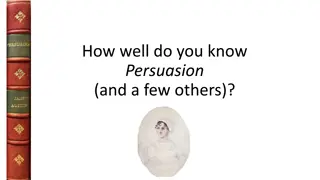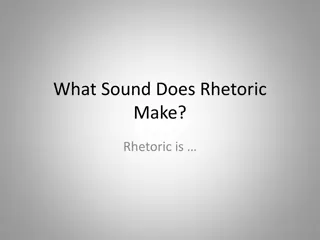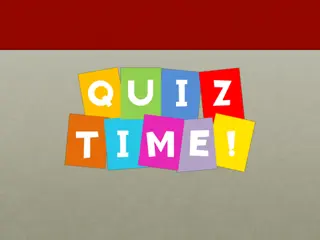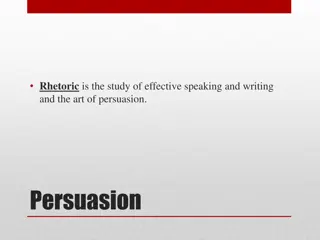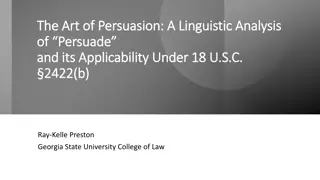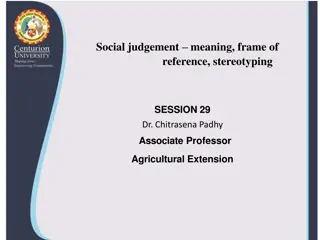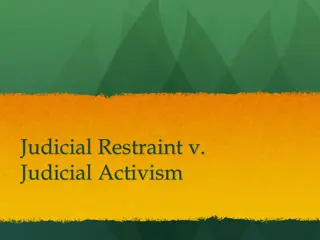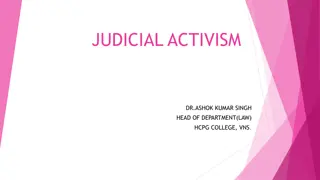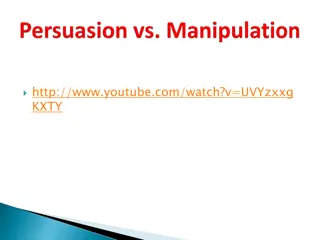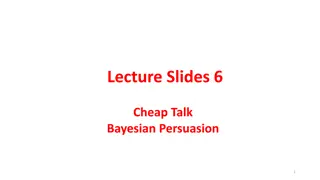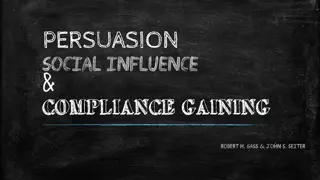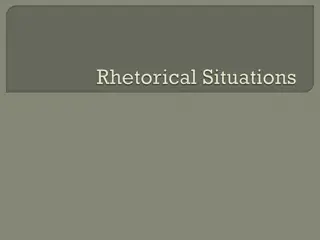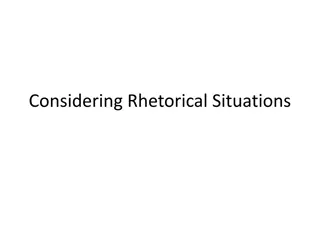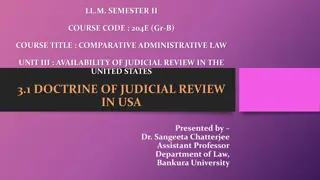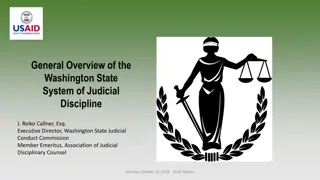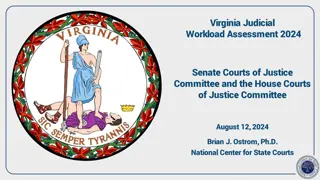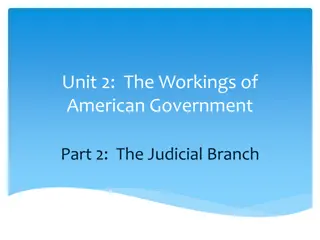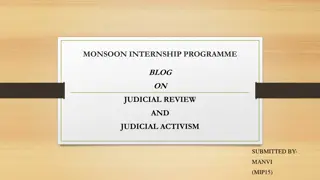Judicial Education Curriculum Proposals: SB-331 Overview
This content presents a series of proposals under SB-331 focusing on judicial education curriculum enhancements. It covers topics such as child abuse, psychological control, bias, trauma, intimate partner violence (IPV), and more. The proposals aim to equip judicial professionals with knowledge and
1 views • 15 slides
JUDICIAL REVIEW OF NATIONAL ACTION BY UNCLOS COURTS AND TRIBUNALS
International judicial review involves oversight by international courts and tribunals over the actions of States Parties in implementing their international commitments. UNCLOS courts exercise supervisory jurisdiction through grounds of review like due regard, reasonableness, necessity, and proport
1 views • 7 slides
Florida Judicial Ethics 2024: Learning Objectives and Resources
Explore common problems under the Code of Judicial Conduct, develop solutions and strategies, and utilize available resources to ensure ethical conduct in the judicial system. Judge Kroll and Mr. Teagle provide educational content but encourage individual analysis. Consult the Florida Judicial Code,
1 views • 81 slides
Overview of Non-Judicial Foreclosure Process in Washington State
Understanding the benefits and process of non-judicial foreclosure in Washington State, including the definition of foreclosure, two types of foreclosures, the reasons for choosing non-judicial foreclosure, who is eligible for this process, and the steps involved, such as the notice of default and t
0 views • 14 slides
Importance of Media in Judicial Proceedings: Safeguarding Fair Trials
Media plays a crucial role in ensuring the right to a fair trial by providing transparency, scrutiny, and accountability in judicial proceedings. Open justice, supported by media coverage, helps prevent miscarriages of justice and upholds fairness in legal processes. While media freedom is essential
3 views • 18 slides
Legal Education and Judicial Ethics Seminar - Transforming Legal Cultures
Enhance your understanding of the CPR overriding objective and its interpretative mandates in the legal context. Explore concepts of substantive and procedural justice, principles of proportionality, and the judicial oath of office. Delve into the Supreme Law of the Bahamas, right to protection of t
0 views • 54 slides
Essential Responsibilities and Management in Judicial Court System
Explore the vital aspects of maintaining judicial records, court management, judge responsibilities, and court work division in the judicial system. Learn about the skill sets required for effective court management, essential duties of a judge, and the administrative functions involved in the judic
0 views • 50 slides
Mastering Rhetorical Devices for Persuasion
Understand the art of rhetoric and the power of persuasion through ethos, pathos, and logos. Explore how writers use varying techniques like formal word choice, emotional appeal, and allusion to sway audiences. Delve into the persuasive appeals of ethos, pathos, and logos as explained by Greek philo
0 views • 12 slides
The Art of Rhetoric and Persuasion: A Journey from Greece
The history of rhetoric and the concepts of persuasion trace back to ancient Greece with prominent figures like Aristotle and Plato. Aristotle's book, "The Art of Rhetoric," introduced the three methods of persuasion - Pathos, Logos, and Ethos. Pathos appeals to emotions, Logos involves logic and re
0 views • 25 slides
The Future of Judiciaries in Africa: Comparative Transitional Jurisprudence
Judicial independence in Africa is crucial for upholding the rule of law and fostering economic growth. This article explores the key aspects of judicial independence, the challenges faced in implementing it, and the impact on governance and human rights. Countries in transition, such as Kenya, are
0 views • 25 slides
Enhancing Judicial Capacity for Environmental Law: Curriculum and Challenges
Environmental law curriculum for judicial education emphasizes the importance of knowledge and expertise in handling environmental justice issues. Prerequisites include competent rule of law, mature judicial system, independent bar, and well-equipped enforcement agencies. To address challenges faced
0 views • 18 slides
Understanding the Influences on Supreme Court Decision Making
Explore the essential aspects that influence how Supreme Court judges decide cases, including issues like judicial restraint vs. activism, influences on decision-making, precedent, and judicial philosophy such as originalism. Gain insights into the complexities surrounding constitutional interpretat
0 views • 9 slides
Understanding Judicial Review in Suing Public Authorities
Judicial review is the inherent right of courts to review decision-making processes of public bodies. It allows for challenging and analyzing decisions, granting public law remedies like declaration, certiorari, mandamus, prohibition, and quo warranto. Those adversely affected by public duty actions
0 views • 13 slides
Ensuring Judicial Independence and Accountability: Model Code of Judicial Conduct
An overview of the history and significance of the Model Code of Judicial Conduct, focusing on judicial independence, integrity, and accountability. The discussion highlights the crucial role of an impartial judiciary in upholding the rule of law and the efforts made to update and maintain ethical s
0 views • 16 slides
Quasi-Judicial Roles and Ethical Responsibilities in Decision-Making
Exploring the distinction between legislative and quasi-judicial roles in decision-making processes, this content delves into examples, principles, and ethical responsibilities. It emphasizes fairness, impartiality, and the importance of public trust in upholding ethical standards within quasi-judic
0 views • 34 slides
Understanding the Doctrine of Ripeness in Judicial Review
The doctrine of ripeness in judicial review focuses on the timing of court intervention, ensuring that cases are mature enough for adjudication. It aims to prevent premature decisions and conflicts with other branches of government, emphasizing the need for cases to be fit for judicial review before
0 views • 12 slides
Mastering the Art of Persuasion: A Review of "Thank You for Arguing
Explore the world of persuasion through the insightful chapters of "Thank You for Arguing." Unveil the power of rhetoric and sharpen your skills in influencing others. From understanding argument strategies to setting effective goals, this book is your guide to becoming a persuasive communicator.
1 views • 83 slides
Test Your Knowledge of Persuasion by Jane Austen
Test your knowledge of Jane Austen's novel "Persuasion" with these trivia questions about the characters, plot, and themes. Discover how well you remember key details like the ages of Anne Elliot and Captain Wentworth, Lady Russell's favorite pastime, Sir Walter's financial distress, and the rift be
0 views • 38 slides
Understanding the Art of Rhetoric
Explore the diverse perspectives on the concept of rhetoric, ranging from Plato and Aristotle to modern thinkers like Henry Ward Beecher and Andrea Lunsford. Rhetoric is depicted as the art of persuasion, with various scholars defining it as enchanting the soul, discovering means of persuasion, or i
1 views • 13 slides
Understanding the Power of Persuasion in Criminal Law
Explore the art of persuasion in criminal law, focusing on making effective arguments, analyzing murder statutes, and applying facts to crime elements. Discover how persuasion plays a vital role in convincing juries of guilt or innocence, and delve into the themes of prosecution versus defense.
0 views • 17 slides
Understanding Rhetoric and Persuasion Techniques
Rhetoric is the art of effective speaking and writing, encompassing persuasion techniques like PATTR analysis, Aristotelian appeals (Pathos, Logos, Ethos), and understanding speaker-audience dynamics. Logos appeals to logic, Ethos to ethics, and Pathos to emotions, with an important focus on audienc
0 views • 18 slides
Analysis of Persuasion Techniques Under 18 U.S.C. 2422(b)
This linguistic analysis delves into the art of persuasion as outlined in 18 U.S.C. 2422(b). The discussion covers cases like United States v. Zupnik and the applicability of laws regarding persuasion and coercion of individuals under 18 years old for illegal activities. Different circuit court inte
0 views • 18 slides
Understanding Social Judgment Theory: Persuasion and Cognitive Maps
Social Judgment Theory (SJT) involves self-persuasion through comparing new ideas with existing attitudes. By considering an example where individuals have differing views on religion, the theory explores persuasion strategies focusing on anchors, alternatives, and ego-involvement. Reflective journa
0 views • 10 slides
Understanding Judicial Restraint vs. Judicial Activism & Selective Incorporation in U.S. Law
Judicial restraint emphasizes a strict interpretation of the Constitution, while judicial activism advocates for a flexible approach to adapt to modern circumstances. Selective incorporation examines the application of the Bill of Rights to state actions, especially relevant during the 14th Amendmen
0 views • 13 slides
Understanding Judicial Activism and Judicial Review in Legal Systems
Judicial activism involves the use of judicial power to benefit society, expanding judicial review to declare laws unconstitutional. The courts need to be active to protect constitutional rights, as the executive and legislative branches may fail in their duties. Judicial activism in India, through
0 views • 9 slides
Understanding Persuasion and Manipulation in Communication
Explore the concepts of persuasion and manipulation in communication, analyzing examples and their effects on decision-making. Learn how authors persuade readers, evaluate arguments, identify fallacies, discern tone, and understand the Rhetorical Triangle. Discover the role of subject evaluation and
0 views • 58 slides
Strategic Communication in Bayesian Persuasion
Understanding the concepts of cheap talk and Bayesian persuasion in strategic communication, where information can be conveyed via direct communication even in the presence of conflicts of interest. Explore how biased senders influence noisy communication, and analyze communication equilibria in sce
0 views • 22 slides
Strategies for Effective Social Influence and Compliance in Persuasion
In "Persuasion, Social Influence & Compliance Gaining" by Robert H. Gass and John S. Seiter, Chapter 11 explores sequential persuasion tactics such as pregiving and the foot-in-the-door technique. Pregiving, where favors or gifts create a sense of indebtedness, is effective due to factors like likin
0 views • 14 slides
Understanding the Art of Salesmanship in Modern Marketing
Salesmanship is a crucial skill in personal selling, involving face-to-face interactions to influence buying decisions through persuasion and product knowledge. It plays a vital role in modern marketing strategies, adapting to diverse customer needs and preferences. Salesmanship emphasizes the power
0 views • 27 slides
The Structure and Function of the Judicial Branch in the US Constitution
The United States Constitution establishes the judicial power in the Supreme Court and other inferior courts as ordained by Congress. It outlines the qualifications, appointment process, and benefits for federal and state-level judges, as well as the importance of judicial independence. The content
0 views • 39 slides
Enhancing Real Estate Bidding with Game Theory and Bayesian Persuasion
Explore how game theory and Bayesian persuasion can be leveraged in real estate transactions to influence bidding behavior, address information asymmetry, and navigate market dynamics. Understand the role of agents, impact on property prices, and challenges faced in high-value transactions.
0 views • 14 slides
Understanding Rhetoric: Aristotle's Three Means of Persuasion
Rhetoric, as Aristotle defined it, is the art of persuasion through available means. This involves utilizing logos (logic), pathos (emotions), and ethos (trustworthiness) to influence an audience. Writing serves various purposes like self-exploration, communication, entertainment, record-keeping, or
0 views • 16 slides
Climate Change Litigation in Aotearoa/New Zealand: LCANZI Action and Judicial Review
The Lawyers for Climate Action NZ Incorporated (LCANZI) are actively involved in climate change litigation in Aotearoa/New Zealand, including challenging government decisions related to climate responses. A notable case involved a judicial review against Auckland Transport, where the High Court refu
0 views • 6 slides
Exploring Rhetoric: Understanding the Art of Persuasion and Communication
Delve into the world of rhetoric through insightful discussions on what rhetoric entails, its ethical implications, and the importance of listening and synthesis in college writing. Uncover the power of language and persuasion as a means of effective communication and critical thinking in academic c
0 views • 22 slides
Understanding the Doctrine of Judicial Review in the United States
Judicial Review is a crucial power of the judiciary to review the constitutionality of laws and executive orders. This article explores the origin of Judicial Review in the United States, focusing on the landmark case of Marbury v. Madison. It delves into the concept, importance, and application of
0 views • 14 slides
Overview of Washington State Judicial Discipline System
The Washington State system of judicial discipline aims to ensure accountability and safeguard judicial independence. It enforces a Code of Judicial Conduct with canons focused on upholding integrity, impartiality, and avoiding impropriety. Each canon contains enforceable rules, and comments provide
0 views • 15 slides
Virginia Judicial Workload Assessment 2024 Overview
The Virginia Judicial Workload Assessment 2024 aims to provide an objective measure of judicial workload for determining judgeships. It involves a comprehensive approach using quantitative and qualitative data to assess the need for judges in Circuit, General District, and Juvenile & Domestic Relati
0 views • 27 slides
The American Judicial Branch: Structure and Judicial Review
The American judicial system consists of District Courts, Appellate Courts, and the Supreme Court. District Courts handle initial cases, Appellate Courts hear appeals, and the Supreme Court is the highest authority. Justices are nominated by the President and confirmed by the Senate. Judicial review
0 views • 12 slides
Testing the Power of Interest Group Persuasion: A Field and Survey Experiment
Examining the impact of interest group persuasion through a parallel field and survey experiment conducted by Alexander Wuttke, Andreas Jungherr, and Harald Schoen at the University of Mannheim. The study focuses on comparing persuasive tactics of interest groups, utilizing artificial environments,
0 views • 27 slides
Understanding Judicial Review and Judicial Activism
Judicial review provides a mechanism for judicial oversight of administrative actions, focusing on legality rather than merits. Grounds for judicial review include illegality and irrationality. Illegality involves decision-makers acting beyond their authority, while irrationality deals with decision
0 views • 14 slides
